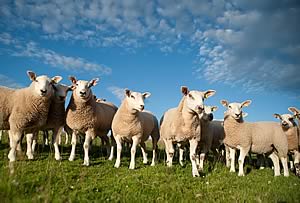 |
|||||||||
|
|||||||||||||||||||
|
|
Sheep Immunity Study Offers Hope of Savings for Farmers Scientists are a step closer to combating a stomach worm infection in sheep that costs UK farmers £80 million every year.
Researchers at the University of Edinburgh and the Moredun Research Institute have discovered a molecule that may help the worm beat the sheep’s natural defences. The disease – called parasitic gastroenteritis (PGE) – is caused by a worm that makes its home in the stomach of the sheep. PGE causes energy to be diverted away from a sheep’s vital processes – such as meat, milk and wool production – to repair its damaged gut and to boost its immune response. It can cause weight loss and dehydration and is sometimes fatal. The molecule – called Tci-MIF-1 – is produced by the infecting worms and may mimic the action of a chemical messenger in the sheep’s immune system. The team believes that these parasites produce a number of molecules, the role of which is to confuse the sheep’s immune defence mechanisms so that the worms can survive for longer. Scientists hope the molecule can be used to help design new vaccines and drug treatments. The team says that new strategies to control the disease are urgently needed because the development of drug resistance has rendered current treatments ineffective. PGE is passed around a flock when the eggs pass out through the sheep’s digestive system, hatch and develop into infective larvae in grass. When other sheep graze they too become infected. A similar molecule is made by the human hookworm, which affects over 1 billion people worldwide. Lead researcher Professor Jacqui Matthews, of the University of Edinburgh’s Centre for Infectious Diseases, said, “The discovery of this molecule is an exciting step forward in our understanding of the way worms affect mammalian immune systems. As our knowledge of these worms expands we come closer to finding new ways to control the diseases they cause.” The research was carried out at the University of Edinburgh’s Centre for Infectious Diseases and Moredun Research Institute. It was funded by the Scottish Government Rural and Environmental Research and Analysis Directorate (RERAD) and the Wellcome Trust.
|
||||||||||||||||||

|
|
||||||||||||||||||
| home | agri-services | pedigree
pen | news | dairy | beef | machinery property | organisations | site map |
|||||||||||||||||||

